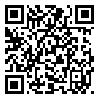Volume 21, Issue 1 (Spring- In Press 2026)
Salmand: Iranian Journal of Ageing 2026, 21(1): 0-0 |
Back to browse issues page
Download citation:
BibTeX | RIS | EndNote | Medlars | ProCite | Reference Manager | RefWorks
Send citation to:



BibTeX | RIS | EndNote | Medlars | ProCite | Reference Manager | RefWorks
Send citation to:
Pourmollamirza A, Valizaeh L, Navab E, Matlabi H, Zamanzadeh V. Elderly Perceived Challenges of the Intergenerational Gap: A Qualitative Study. Salmand: Iranian Journal of Ageing 2026; 21 (1)
URL: http://salmandj.uswr.ac.ir/article-1-3050-en.html
URL: http://salmandj.uswr.ac.ir/article-1-3050-en.html
1- Department of Geriatric Nursing, Faculty of Nursing and Midwifery, Shahid Beheshti University of Medical Sciences, Tehran, Iran.
2- Department of Pediatric Nursing, Faculty of Nursing and Midwifery, Shahid Beheshti University of Medical Sciences, Tehran, Iran.
3- Department of Geriatric Nursing, Faculty of Nursing and Midwifery, Tehran University of Medical Sciences, Tehran, Iran.
4- Department of Geriatric Health, Faculty of Health Sciences, Tabriz University of Medical Sciences, Tabriz, Iran.
5- Department of medical-Surgical Nursing, Faculty of Nursing and Midwifery, Shahid Beheshti University of Medical Sciences, Tehran, Iran. ,vzamanzadeh@gmail.com
2- Department of Pediatric Nursing, Faculty of Nursing and Midwifery, Shahid Beheshti University of Medical Sciences, Tehran, Iran.
3- Department of Geriatric Nursing, Faculty of Nursing and Midwifery, Tehran University of Medical Sciences, Tehran, Iran.
4- Department of Geriatric Health, Faculty of Health Sciences, Tabriz University of Medical Sciences, Tabriz, Iran.
5- Department of medical-Surgical Nursing, Faculty of Nursing and Midwifery, Shahid Beheshti University of Medical Sciences, Tehran, Iran. ,
Abstract: (1710 Views)
Objectives: The intergenerational gap, as one of the prominent consequences of social, cultural, and technological transformations in societies, has led to significant changes in relationships between the elderly and younger generations. The present study was conducted with the aim of discovering and explaining the perceived challenges of the elderly regarding the intergenerational gap.
Materials and Methods: This qualitative study was conducted in the city of Tehran, Iran, in 2023–2024. The participants included 21 elderly individuals (11 women and 10 men) aged between 65 and 80 years, selected through purposive sampling. Data were collected through semi-structured interviews and analyzed using the steps of qualitative content analysis.
Results: Data analysis led to the extraction of 97 initial codes, which were ultimately classified into three main categories: (1) Rejection: the experience of reduced communication between the elderly and the younger generation and the feeling of being sidelined from family and social contexts; (2) Diminished dignity: the perception of decreased respect, disregard for the roles and experiences of the elderly, and decline in their social position among the younger generation; and (3) Intergenerational conflicts: the emergence of tensions and incompatibilities between the elderly and the younger generation.
Conclusion: The results of this study show that, from the perspective of the elderly, the intergenerational gap is a multidimensional phenomenon that can lead to negative experiences and unpleasant challenges for them. These challenges may expose the elderly generation to various disorders. Therefore, it is necessary for policymakers, social planners, and aging-related professionals to adopt intergenerational approaches that facilitate effective interaction and dialogue between generations and take steps toward reducing the intergenerational gap through cultural, educational, and social programs.
Materials and Methods: This qualitative study was conducted in the city of Tehran, Iran, in 2023–2024. The participants included 21 elderly individuals (11 women and 10 men) aged between 65 and 80 years, selected through purposive sampling. Data were collected through semi-structured interviews and analyzed using the steps of qualitative content analysis.
Results: Data analysis led to the extraction of 97 initial codes, which were ultimately classified into three main categories: (1) Rejection: the experience of reduced communication between the elderly and the younger generation and the feeling of being sidelined from family and social contexts; (2) Diminished dignity: the perception of decreased respect, disregard for the roles and experiences of the elderly, and decline in their social position among the younger generation; and (3) Intergenerational conflicts: the emergence of tensions and incompatibilities between the elderly and the younger generation.
Conclusion: The results of this study show that, from the perspective of the elderly, the intergenerational gap is a multidimensional phenomenon that can lead to negative experiences and unpleasant challenges for them. These challenges may expose the elderly generation to various disorders. Therefore, it is necessary for policymakers, social planners, and aging-related professionals to adopt intergenerational approaches that facilitate effective interaction and dialogue between generations and take steps toward reducing the intergenerational gap through cultural, educational, and social programs.
Type of Study: Research |
Subject:
Social
Received: 2025/04/14 | Accepted: 2025/07/22 | Published: 2026/03/30
Received: 2025/04/14 | Accepted: 2025/07/22 | Published: 2026/03/30
Send email to the article author
| Rights and permissions | |
 |
This work is licensed under a Creative Commons Attribution-NonCommercial 4.0 International License. |







